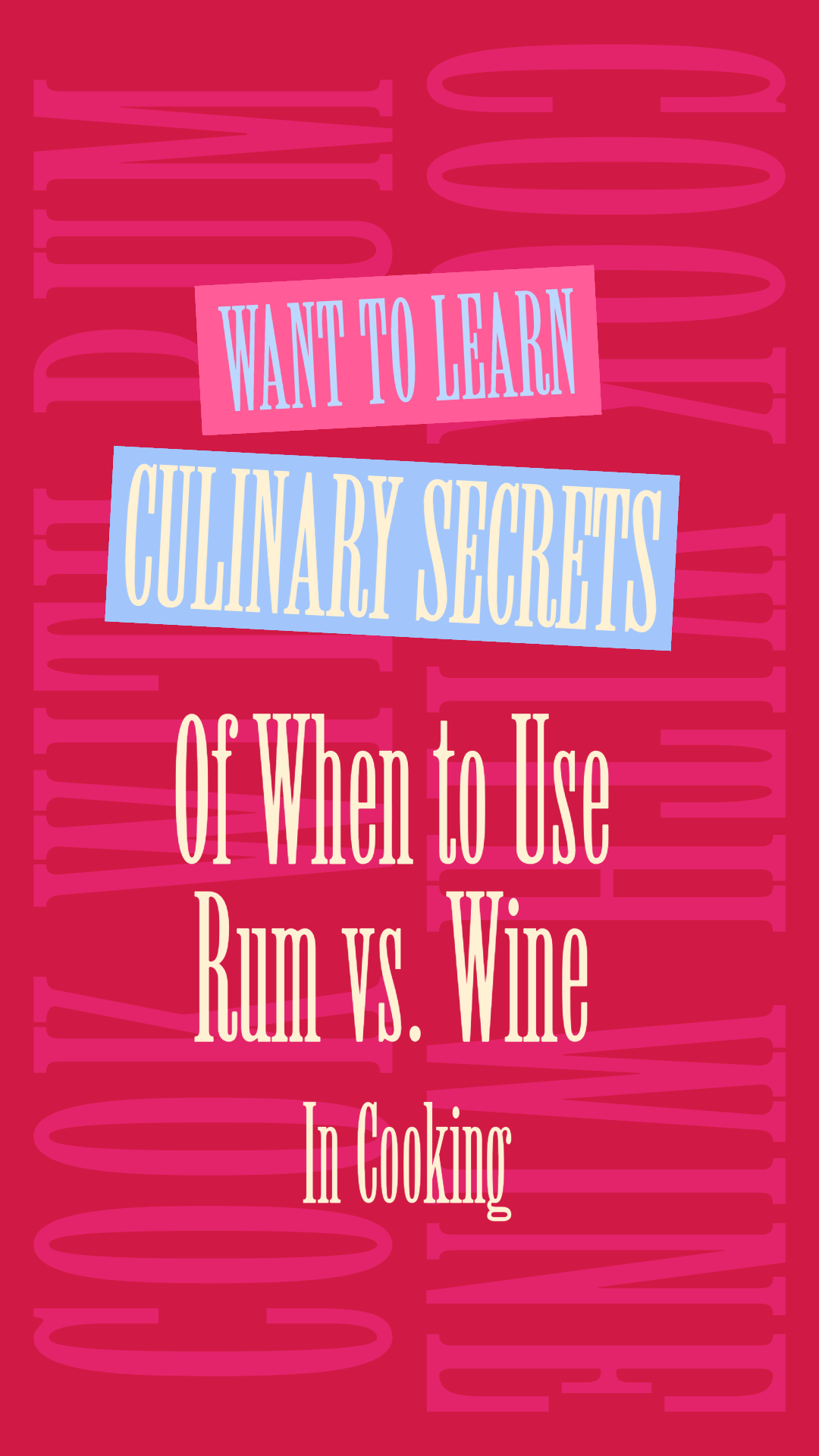Rum vs. Wine: When to Reach for Each in the Kitchen
Understanding how both elevate flavor, in very different ways
There’s a quiet skill to knowing when rum — not wine — is the better choice in your kitchen. It’s not about making food taste sweet; it’s about creating depth, warmth, and balance in ways you might not expect.
Most of us are familiar with cooking wines: they brighten, they lift, and they add that lively “zing” to sauces and seafood. Rum, though, brings a different kind of magic. It softens sharp edges, enhances natural flavors, and leaves behind subtle notes of vanilla, spice, or caramel — depending on the variety.
Think of it this way:
Wine wakes things up.
Rum slows them down — in the best possible way.
A splash of white wine in a pan sauce gives you crisp vibrancy. Replace it with white rum, and the same sauce turns smooth and rounded, with a hint of cane richness that lingers just long enough to make you curious.
Neither approach is better; they simply lead to different destinations. And once you understand how each spirit behaves in the pan, you’ll start to see rum not as something reserved for cocktails — but as one of the most versatile ingredients in your kitchen.
Wine: The Brightener
Wine brings brightness and lift to food. It adds gentle acidity — the same kind of balance you’d get from a squeeze of lemon, but with more complexity. That acidity cuts through richness, keeping sauces and stews from feeling too heavy.
When you pour wine into a hot pan, most of the alcohol evaporates, leaving behind natural acids and flavor that wake everything up. That’s why chefs use it to deglaze — it loosens browned bits and turns them into the foundation of a sauce.
What wine does:
Adds brightness and balance to rich dishes
Enhances savory flavors, especially in meats and sauces
Builds depth when reduced in the pan
Best for: tomato sauces, seafood, citrus-forward dishes, or quick pan sauces that need a little zip.
Think of wine as the ingredient that lifts a dish — it adds sparkle and energy.
Rum: The Warm Deepener
Rum does something entirely different. Instead of adding acidity, it brings warmth, smoothness, and aroma. Even though it’s made from sugarcane, rum doesn’t make food taste sweet — the sugars are fermented and distilled into alcohol. Once that cooks off, what’s left are natural flavor compounds like vanilla, caramel, spice, or cocoa, depending on the rum you use.
When added to butter, cream, roasted vegetables, or caramelized sauces, rum enhances natural flavors and brings them into harmony. It softens sharp edges and adds depth that lingers.
What rum does:
Adds warmth, smoothness, and gentle complexity
Enhances creamy, buttery, or roasted flavors
Rounds and balances without sharp acidity
Best for: cream sauces, glazes, roasted meats or vegetables, and desserts with caramel, spice, or tropical fruit.
Rum doesn’t brighten; it harmonizes. It turns separate flavors into something unified and deeply satisfying.
If your dish feels too heavy, add wine for balance.
If it feels too acidic or sharp, a splash of rum will smooth it out.
Understanding Kōloa Rum Varieties
The rum you choose will shape the final flavor of your dish. Here’s how the main varieties differ, based on Kōloa Rum’s official tasting notes and character:
Kōloa White Rum: Light and clean with soft cotton candy notes. Perfect for seafood, marinades, or tropical vinaigrettes where subtle sweetness works best.
Kōloa Gold Rum: Smooth and mellow with hints of vanilla and caramel. Excellent in buttery sauces, roasted chicken, or vegetable glazes.
Kōloa Dark Rum: Rich and full-bodied with deep vanilla, cocoa, and espresso tones. Ideal for hearty recipes like beef reductions, chocolate sauces, or desserts that need depth.
Kōloa Spice Rum: Aromatic with cinnamon, nutmeg, and clove. Perfect for cozy dishes like roasted sweet potatoes, fall glazes, or holiday desserts.
Kōloa Coconut Rum: Soft and tropical with toasted coconut notes. Lovely in light sauces, shrimp dishes, or fruit-based desserts.
Each one has its own place in the kitchen — just like choosing between red, white, or sparkling wine.
How to Use Both
Both wine and rum should be cooked briefly so the alcohol burns off, leaving only the flavor behind.
Use wine earlier in cooking for freshness and acidity.
Add rum later to enrich and round out a sauce.
A tablespoon or two of rum reduced in butter or cream adds aromatic depth — especially with herbs, caramelized onions, or roasted vegetables.
Bringing It All Together
Wine and rum each bring their own kind of magic to the table — I don’t favor one over the other. It really depends on what’s cooking. Some dishes call for the crisp lift of wine, while others shine with the mellow warmth that only rum can bring.
What I do love is showing how rum fits right in where people least expect it. It’s incredibly versatile — just as comfortable in a pan sauce or marinade as it is in a dessert or cocktail. A small splash can soften sharp edges, deepen flavors, or give a familiar recipe a whole new twist.
That’s what I love sharing in my newsletter: how to cook with rum in real, approachable ways. You’ll find island-inspired recipes, clever kitchen tips, and plenty of ideas for putting that bottle of Kōloa Rum to good use — not just in your glass, but in your favorite meals too.
Mahalo nui loa,
Nicole
The Island Spirit Kitchen


